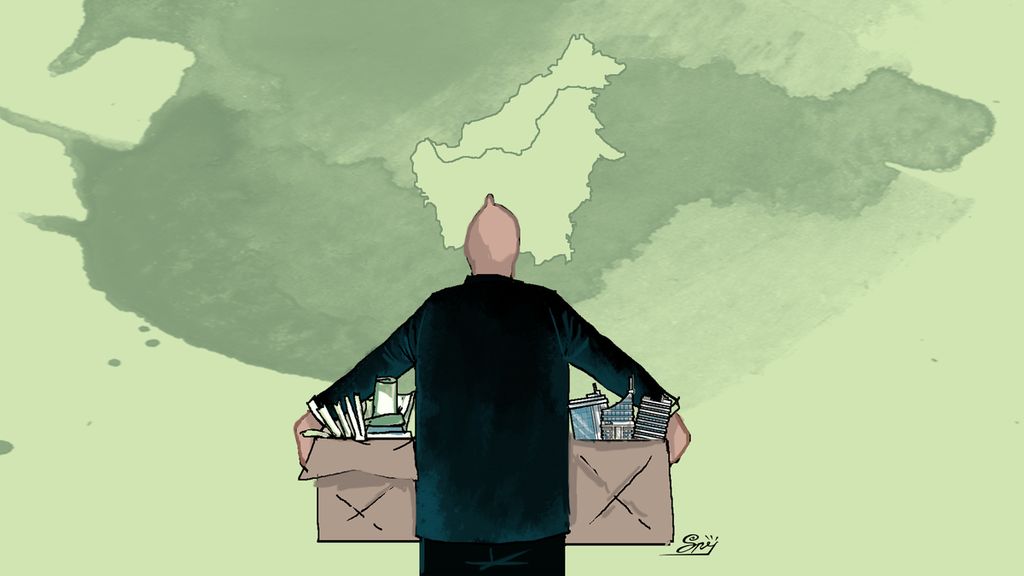National Capital, Some Notes
So what needs to be taken into account? Anyone may have been dreaming of holding an August 17 flag-raising ceremony in the new capital city in 2024.

The draft law on the new state capital (IKN) has been ratified by President Joko “Jokowi” Widodo into IKN Law No. 3/2022.
The relocation plan still seems to be raising many questions, while the time concerning its realization must still be under calculation.
Given the complicated work that needs to be done, many wonder whether all of this can be accomplished as aspired and planned, especially when being prepared in a short time and in a somewhat hasty manner. The work to be done concerns the tight financing capacity of the state, the complexity of land acquisition and water resources, the capital city development pattern and its financing scheme (including the required consistency in regional spatial planning and urban spatial planning).
Also read:
New Capital to be Built Once Five Derivative Regulations are Finalized
So what needs to be taken into account? Anyone may have been dreaming of holding an August 17 flag-raising ceremony in the new capital city in 2024. Suppose the time for state capital relocation can no longer be put on hold, sooner or later a question may arise: will the new state capital be run and managed as a special government, or a regional government? Many may be reluctant to raise such a question.
Article 1 No. 2 of the IKN Law states: "The state capital city named Nusantara is a regional government unit with special status [...] and so on". Still in the same article is: "The Special Regional Government of the State Capital City Nusantara is a regional government with special status [...] and so on" (number 8). The word "regional" on the provision, which is written in italics, draws suggestions of being multi-interpreted with the substance being deliberately held up.
Still in Article 1, it mentions Regional Property (as opposed to State Property), which can be elaborated as goods purchased or obtained at the expense of the Regional Budget (APBD). The state capital administration works on APBD? What and where is the problem?
Time bomb
Is the meaning and purpose of the word "regional" the same as that in the Regional Government Law? Even though the IKN Law does not refer to the Regional Government Law as a legal basis, it is important to pay attention to three issues. First, the definition of APBD has a definite meaning and function in the Regional Government Law. Second, the initial use of the "special government" term had been actually accurate. Only later in the discussion of the bill and approved by the DPR, was it changed to “a regional government with special status”.
Third, as a regional government with special status, the state capital administration runs and manages government affairs by itself as stipulated and regulated by this Law (Article 5 Paragraphs 2 and 5). Adding to the contentious substance is the explanation of Article 5.
With special status, the new capital city will be without regional legislature (DPRD), the head being appointed by the President (no regional election, and the administration having the authority to make its own regional regulations, all regional government affairs, except for foreign politics, defense and security, judiciary, national monetary-fiscal, religion. It's similar to the concept of authoritativeness shared between the central and the regional governments, isn't it?

While the public questions the dualism between the authorities and the regional government, the media has reported a comment by one of the deputy chairs of the special committee for the discussion of the bill that new capital city administration is a regional government that simultaneously runs the capital city affairs. Isn't there a problem later behind it all?
Is the capital city a special territory belonging to the state and nation, or the region? This question, which should have been answered before the law was finalized, does have a long impact and can be a prolonged issue. We are cautious about the new capital city falling into the same fate as Jakarta, whose regional government also has an additional function as the organizer of the capital city.
Jakarta is grappling with perennial problems: floods every rainy season, traffic jams, not to mention problems of public order, security, peace, cleanliness and traffic pollution.
The element of regional government emerges as the first, and in fact should become the main one. Capital organizer? It's just an attached additional function. It’s like looking at a map of the problem, it seems that everyone or minister, even the President know very well that the Jakarta regional government has been immersed in the hustle and bustle of regional autonomy. The author raised the issue twice (Kompas, 2010 and 2017). Jakarta is grappling with perennial problems: floods every rainy season, traffic jams, not to mention problems of public order, security, peace, cleanliness and traffic pollution.
Amid degradation in quality of life and environmental conditions, let alone drinking water, Jakarta has yet to be able to tackle the problem of clean water service. With all the noise around the issue of autonomy, for a smooth state governance, what can the President and his government do? Aren't those problems the domain of the Jakarta regional government, and not the President?
Some may argue that the governance portions, functions, responsibilities and mechanisms of handling the capital city affairs and autonomy are all already regulated in the Jakarta Regional Government Law. Despite not being referred to as a minister-equivalent, the Jakarta governor, as stipulated in the law, is entitled to attend a Cabinet meeting when it comes to dealing with city affairs. The question is, given the examples of the cases above, why the problems persist. Jakarta is getting more and more crowded, and there seems to be no beaconing of a solution based on the law. The end of the story is now well known to all.
Also read:
Involving Private Sector in New Capital City Development is Necessity
If not hurriedly tempted to find excuses to justification or denial, it's good to reflect on the experience. It's only a matter of time that the regional issue will become the drawback in the implementation of the new capital city later. A new chapter of a story reminiscent of that of Jakarta is likely to emerge, although perhaps in a different version and intensity. When it comes to coping with political interests, there will usually be a proposal to amend the law, and the "vested interest" will become clear. Isn't regional leadership one of the goals and objectives for political parties?
Think clearly
The reason for clarifying the alignment of the IKN Law with the Law and the principles of administering (in) regional government will be prone to being a shortcut to obtain legal legitimacy for political interests. In a time of political euphoria, which gradually presents issues of democracy, autonomy and human rights as a means of struggle, all is possible. If so, the problems will be the same. The difference is place and time: the old capital city in Java, and the new one in Kalimantan.
All weighs on the basic issue: the clearly defined concept and clear thought. The Americans have been able to make Washington their capital, and the only federal territory in the US that is administered with a special municipality. The capital city, which is named Columbia (a symbol of the primacy of women in the US) is managed by a special government led by a mayor, while maintaining the political and socio-economic rights of the citizens.
Washington DC does not belong to Virginia or any other state. Australians know Canberra doesn't belong to New South Wales, or Victoria. They call it the Australian Capital Territory, belonging to the state and nation of Australia. Malaysians as a nation have Putrajaya/Kuala Lumpur as a federal territory, not belonging to the state or sultanate of Johor, Perak, or others.
Why now when we deal with our new capital city, we are bound by the phrase “regional”? Is it just for the sake of democracy? Or is it the struggle for regional aspirations? Autonomy? Decentralization and de-concentration? Or is it because of purely practical political considerations and interests that regional government is the domain of political parties, and therefore it is appropriate to plant the seeds of issues to reap the fruits in the future?

There may be views that it is for its alignment with the principles laid down in the Constitution. It should be noted that the concept in Article 18 of the Constitution is a matter of dividing the territory of the state. It's not about the administrational hierarchy putting the state before regions. It is the Regional Government Law that describes this concept, and translates the division of large and small areas into the forms and mechanisms of regional government. But, isn't it neither wrong, if in the concept of large and small areas, there are also small administrative areas?
In addition to the concept of the division of large and small territories, don't we also recognize the concept of special status? We also have a lot of knowledge about the special territory. In the context of new capital city, we can apply it as a “Republican territory”, without the need to link it with regional government. Let’s try to be consistent with the formulation of the state capital vision as a symbol of national identity that represents the diversity of the Indonesian nation based on Pancasila and the 1945 Constitution of the Republic of Indonesia (Article 2c).
Such a thought does not need to be deemed as a deviation from Article 18 of the Constitution. If necessary, this issue is actually just a revision of the concept in the Law on Regional Government. To realize this concept in the IKN Law can also be done while maintaining its alignment with Article 18 of the Constitution.
Apart from that, it is important to take a look at some of the “rocks” that seem to be stored in the law, such as the problem of authority. Authorities are actually given a position at the provincial level (Article 1 point 2) or a ministry (Article 4 Paragraph 1b and Article 5 Paragraph 4). After all, what exactly is the
benefit of equating it to the ministry, while with the power of this law, the head of the authority can still effectively design, build, and move the state capital?
Under control
By observing and being aware of these matters, the concentration on building and managing the needs of facilities/infrastructure in the core areas and development areas for the administration of the central government can be better maintained.
Spatial planning and urban planning for the state capital can be fully managed by the capital city government. Spatial arrangement and allocation, management of government buildings and supporting infrastructure, such as roads, transportation/commuting systems, communication systems and electricity networks, gas, clean water, water disposal and waste treatment systems, urban parks/forests, as well as maintenance of cleanliness and order, can be assumed under one hand since planning.
Learning from the rapid density of Washington DC, as an example, is it necessary to accommodate housing and settlement issues in the core area/National Strategic Area?
During the day, the capital city is only filled with the President, ministers and government officials, ministry officials and security officers. There may be convention and tourism activities. Learning from the rapid density of Washington DC, as an example, is it necessary to accommodate housing and settlement issues in the core area/National Strategic Area?
While still starting from scratch, it is important the core area and state capital development are freed from residential or even an obsession about urban metropolitan.
Also read:
Capital City Relocation must be Public
The need for housing and settlements (even for high-ranking officials), shops, markets, hospitals, education, or other things are better fully developed in the form of satellite areas outside the core zone. The need for breakfast, lunch and dinner for the government employees can be fulfilled by requiring each building to have a café/restaurant (if the canteen is considered less prestigious). The government and the people in the surrounding area will also get a share of pie from the relocation of the capital city.
What is important about the clearly defined concept? Urban planning, structuring and financing could be better designed. The presentation of the city as a place for the administration of the central government can run peacefully and orderly. Cooperation with the private sector can be directed through the division of roles and allocation of space in the peripheral areas, as far as possible involving a mixed pattern of financing or ownership which often creates problems around accountability at the future.
The remaining work to think about: who and what mechanism to help the President oversee all of this. The important thing is not to let the head of the authority change his role to become a “senior minister”, or the President who is stuck busy with the affairs of the authoritativeness.
/https%3A%2F%2Fasset.kgnewsroom.com%2Fphoto%2Fpre%2F2018%2F07%2F10%2F7c7b2d7f-e2f6-4bd5-8e9c-ab03afa0c7c8_jpg.jpg)
Bambang Kesowo
Bambang Kesowo, Public Policy Observer
(This article was translated by Musthofid).